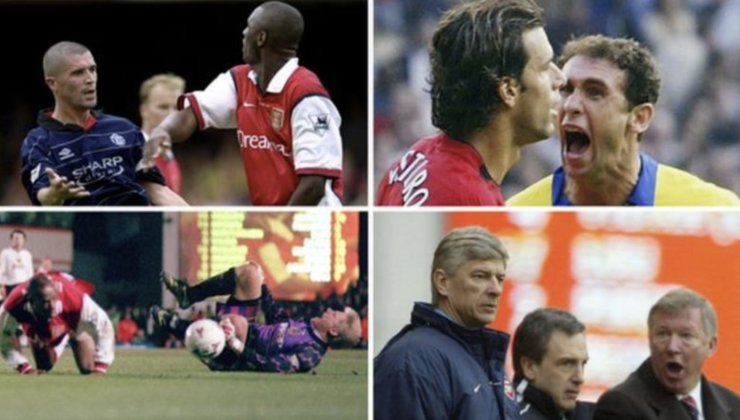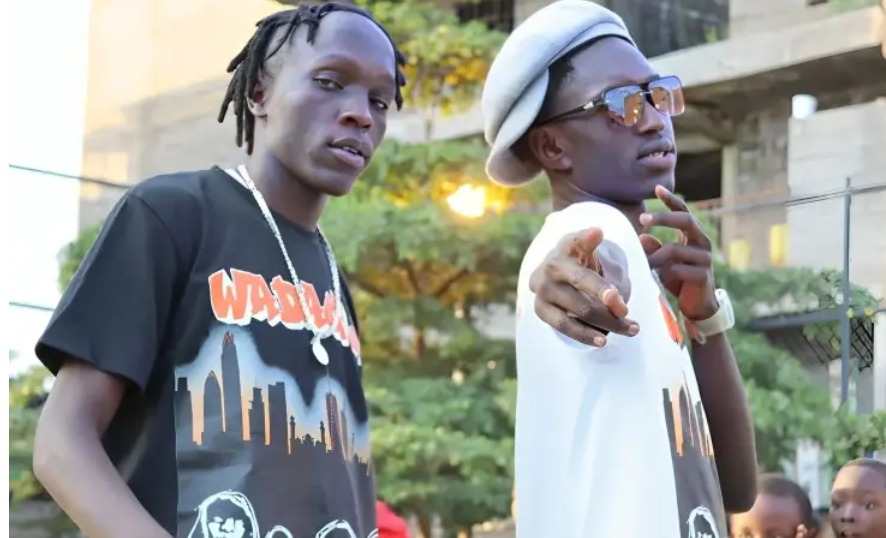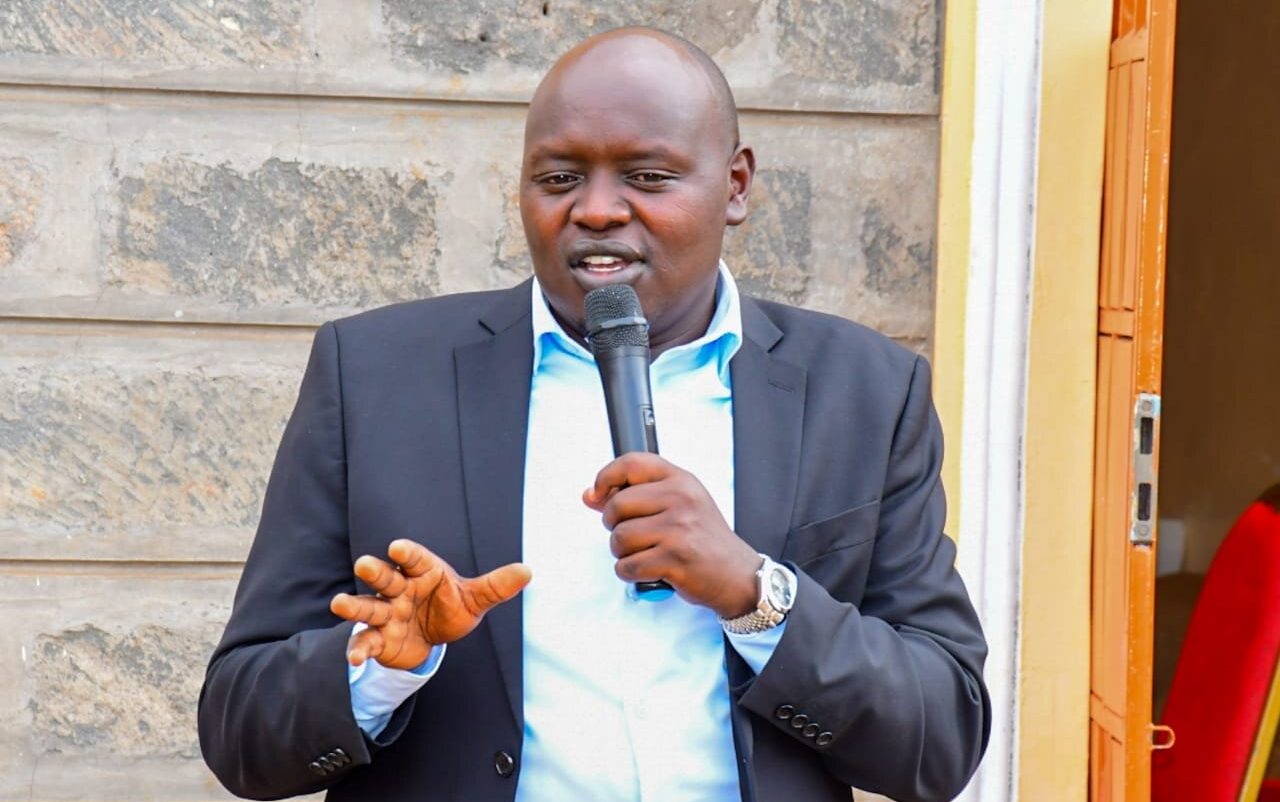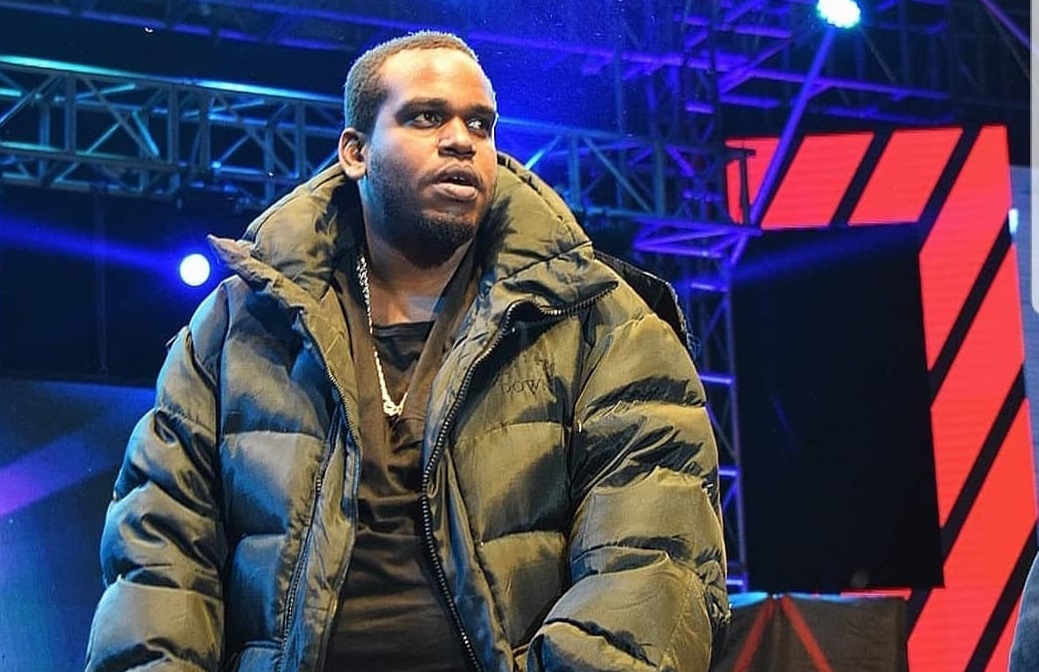For almost a decade, they were the top two teams in English football.
Manchester United and Arsenal face off again in the Premier League on Monday (kick-off 20:00 BST), but there is a feeling that it has become somewhat of a lost rivalry.
Title triumphs have disappeared
The sight of captains Roy Keane or Patrick Vieira holding aloft the Premier League title at the end of the season would have grown to become a tiresome sight for fans of clubs other than Manchester United and Arsenal.
Between 1997 and 2004 United and Arsenal were the only clubs to finish as Premier League champions. They also collected five FA Cups between them during that period.
Between 1997 and February 2005, there were only three meetings when one of them was not sat on top of the table. In contrast, since November 2013, not one of their meetings has involved either side going in as league leaders.
“It was a really intense rivalry at a time when the title was going to go to United or Arsenal,” says Arsenal blogger Andrew Mangan. “The games always felt pivotal when the two teams met, it meant a huge amount.
“Clearly there was a lot of rivalry between the managers, players and the fans and they were the two best teams in England. The rivalry felt personal but that was because of the quality of the teams.”


Times are different now. United have failed to win the title since Sir Alex Ferguson’s last season in charge in 2012-13. Arsenal’s wait goes back to their unforgettable unbeaten season in 2003-04.
With neither considered likely champions this time around, the two now face the prospect of battling to finish in the top four.
“The reality of the situation for both clubs has changed,” adds Mangan. “I did not think it would take this long for us to win the title again. The quality of the two teams has diminished and Arsenal do not look like a team that can win the title and neither do Manchester United.
“It is not as quite as intense as it used to be. It is not the same as it was but it is still one of the big games of the season. If you win it then it can be a real positive for your team.”
‘I’ll see you out there’
“Every time we played you thought ‘there’s going to be fireworks’,” ex-Arsenal midfielder Patrick Vieira once said. He wasn’t wrong.
At the height of their rivalry, there were skirmishes aplenty including allegations of racism, tunnel bust-ups, food fights and on-field scuffles.
Much of the bad blood can be traced back to the pre-Premier League era in October 1990, when a 21-player brawl – Arsenal goalkeeper David Seaman the one man not involved – subsequently saw the Gunners punished with a two-point deduction, with United docked one point.
Six years later, after United beat Arsenal in Arsene Wenger’s first trip to Old Trafford, striker Ian Wright accused goalkeeper Peter Schmeichel of making a racist comment, which the Crown Prosecution Service eventually took no action over.
Three months later at Highbury and with a 50-50 ball to contest, Wright lunged in with a two-footed tackle on to the shin of Schmeichel, though the referee missed the incident and the England forward escaped any sanctions for the challenge.
In 1999, the rivalry witnessed one of the great FA Cup goals as Ryan Giggs’ solo effort settled the semi-final and kept United’s Treble dream alive, but it was in 2003 that things began to get really personal.
Arsenal travelled to Old Trafford in September having lost the title to United the previous season.
With the game heading for a goalless draw, Martin Keown was adjudged to have fouled Diego Forlan in the box only for the usually reliable Ruud van Nistelrooy to smack his spot-kick against the crossbar.
Keown’s response was anything but low key, the defender jumping up and smashing his forearm into the back of the Dutchman’s head before bellowing in his face, the ensuing animosity leading to FA Charges for eight players, including six from Arsenal.
A year later, a 2-0 win including a redemptive penalty from Van Nistelrooy ended Arsenal’s record 49-match unbeaten run. The meeting, however, is perhaps most remembered for a post-match tunnel fracas that saw United manager Sir Alex Ferguson struck by a slice of pizza allegedly thrown by Cesc Fabregas.
More tunnel trouble followed in February 2005 as Roy Keane launched a foul-mouthed tirade, telling Vieira “I’ll see you out there” after the Frenchman was seen to be “bullying” Gary Neville.
The Ferguson v Wenger factor
Ferguson and Wenger – two colossal figures who changed the face of English football.
Together, the pair took charge of more than 2,700 games for Manchester United and Arsenal, winning 34 major trophies and six Manager of the Year awards.
United had gone 26 years without winning the league title before claiming the Premier League in the 1992-93 season and the Red Devils won three more by the time Wenger took charge of his first full season at Highbury.
Nicknamed ‘The Professor’, Wenger stood toe-to-toe with Ferguson and wrestled the title away from his adversary on three occasions.
A deep dislike grew between the pair – they could barely look at each other when shaking hands before a game – but that dissipated as the years went by and the direct rivalry for honours faded.
YouTuber and United supporter Adam McKola says: “Wenger brought something different to the Premier League when he first arrived and people saw him as someone who was changing the game.
“Take a look at Cristiano Ronaldo and Lionel Messi, they constantly push each other. Ronaldo would not be as good as he is now if it was not for Messi. They made each get better and hit the targets.
“Wenger was that person for Ferguson, he made himself look at things differently and made him change tactically. We had someone to beat and target.
“They both disliked each other but then became friends. It was such a clear statement that the rivalry was dead when Ferguson did not see Arsenal as a threat anymore.”
Of the two current managers, Arsenal’s Unai Emery has the better pedigree, winning the Ligue 1 title and two French Cups with Paris St-Germain as well as three Europa Leagues with Sevilla.
Emery also has a four-year spell with Valencia on his CV, while Ole Gunnar Solskjaer’s best showing as boss is two league titles and a cup with Norwegian side Molde.
Emergence of other clubs
Russian billionaire Roman Abramovich’s takeover of Chelsea in 2003contributed to ending the dominance of United and Arsenal. A new force had emerged.
With the Blues spending heavily, back-to-back Premier League titles were delivered by “The Special One” Jose Mourinho in 2005 and 2006.
Now Manchester City and Liverpool are taking the league to new levels under the leadership of Pep Guardiola and Jurgen Klopp respectively,
McKola adds: “You are starting to see a rivalry blossoming between Liverpool and City because their games now tend to stop the other from winning a trophy. It is down to the success of the teams.”
Whether either side can win three titles in a row – like Manchester United – or go the full season unbeaten – like Arsenal – remains to be seen.
Title on their patch and thrashings – some memorable league meetings
Some infamous matches have already been mentioned, as well the 2005 FA Cup final and Champions League semi-final in 2009, but there are plenty of other league encounters that stick long in the memory:
March 1998, Man Utd 0-1 Arsenal: Marc Overmars’ winning goal was the difference and turned the title race in Arsenal’s favour as Arsene Wenger’s side’s 10-game winning run helped them to their first Premier League title.
February 2001, Man Utd 6-1 Arsenal: A first-half hat-trick by Dwight Yorke set United on their way to a thumping victory and they would go on to win the title again.
May 2002, Man Utd 0-1 Arsenal: The Gunners needed just a point to clinch their second double in four years and Sylvain Wiltord’s winning goal proved to be the difference as Arsenal celebrated in front of their fans… at Old Trafford.
April 2003, Man Utd 2-2 Arsenal: A crucial clash towards the end of the season which would have made Arsenal favourites for the title had they won. Instead, Ruud van Nistelrooy and Ryan Giggs cancelled out Thierry Henry’s double to ensure United would collect the title.
August 2011, Man Utd 8-2 Arsenal: United inflicted Arsenal’s heaviest defeat since 1896 through Wayne Rooney’s hat-trick and Ashley Young’s double, but United went on to lose the title on goal difference to Manchester City.










